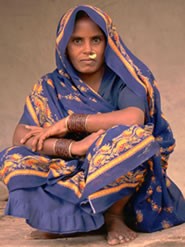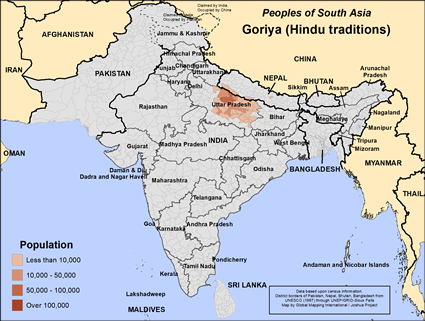Goriya (Hindu traditions) in Nepal

Photo Source:
Copyrighted © 2026
Create International All rights reserved. Used with permission |

Map Source:
People Group data: Omid. Map geography: UNESCO / GMI. Map Design: Joshua Project.
|
| People Name: | Goriya (Hindu traditions) |
| Country: | Nepal |
| 10/40 Window: | Yes |
| Population: | 900 |
| World Population: | 329,900 |
| Primary Language: | Awadhi |
| Primary Religion: | Hinduism |
| Christian Adherents: | 0.00 % |
| Evangelicals: | 0.00 % |
| Scripture: | Complete Bible |
| Ministry Resources: | Yes |
| Jesus Film: | Yes |
| Audio Recordings: | Yes |
| People Cluster: | South Asia Hindu - other |
| Affinity Bloc: | South Asian Peoples |
| Progress Level: |
|
Introduction / History
The Goriya who are also called Gaur are fishermen and boatmen who live in Uttar Pradesh. They are found mainly in Faizabad, Janupur, Sultanpur and Varanasi in the east. The Goriya speak Awadhi and speak Hindi. They read and write in Devanagari. They will not accept food from lower castes but accept food from castes higher than what they are. The Goriya are classed among the lower castes. Domination by higher castes has "scarred" them even to this day.
What Are Their Lives Like?
The Goriya also work as farmers, laborers and in other jobs. Some own small businesses. They eat poultry, fish, mutton and pork. Because of their Hindu religion they do not eat beef. They also eat wheat and rice, seasonal vegetables, fruit, milk and dairy products for example. The men sometimes drink alcohol, but the women do not. Literacy is poor, especially for the girls. (So there is a need for the gospel to be given in oral form).
Marriages are arranged by parents and families and only happen in the community. Child marriages, though common, are becoming less common. Divorce is allowed and divorcees and the bereaved can marry again. A widower marrying the younger sister of his late wife and a widow marrying the younger brother of her late husband takes place too. Property that is of the father is given equally, though only to the sons. Men are in charge, but they value women. Besides doing housework, women help their husbands on the farm, collect fuel, carry water and their opinions are listened to. They are very much involved in religious rites and social occasions. The Goriya sing folk songs and have traditional councils that have control in social matters.
What Are Their Beliefs?
The Goriya are Hindus and have many gods that they worship. They also worship family, village and regional gods. They also worship their ancestors. They believe in the occult and in reincarnation. They celebrate most Hindu festivals.
Brahmin priests perform birth, marriage and death rituals. A set period of birth pollution takes place until the priest does a purification ritual and the newborn baby is named. Head shaving ceremonies are performed for boys and girls. The Goriya dead are cremated, and they have a thirteen-day death pollution period. Then there is a ceremony, and they give a feast for the peace of the bereaved person.
What Are Their Needs?
There are probably no Christ followers among the Goriya people, and very few Christians live anywhere near them. They have few if any chances to respond to the one who offers life to the full.
Prayer Points
Please pray that Christians go to the Goriya in friendship and love and give them the gospel message.
Pray for spiritual receptivity among the Goriya people that will lead many to embrace Jesus Christ no matter what the cost.
Pray for the Lord to bless them in such a way they will know he is both powerful and loving.